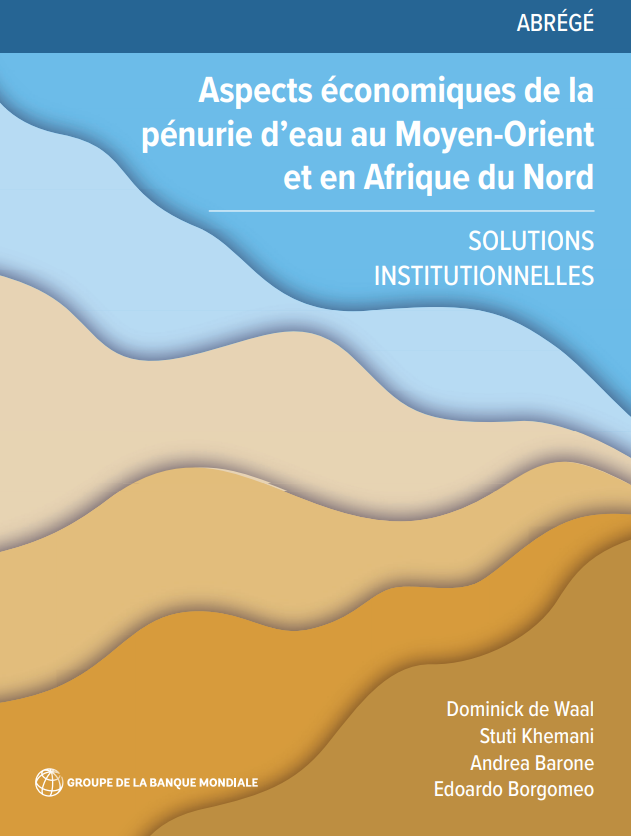Aspects économiques de la pénurie d'eau au Moyen-Orient et en Afrique du Nord, solutions institutionnelles: abrégé
 |
The Economics of Water Scarcity in the Middle East and North Africa: Institutional Solutions: Overview
publication Dec 2023 ; 31 pages
Aut. Andrea Barone & Edoardo Borgomeo & Dominick de Waal & Stuti Khemani
Ed. World Bank - Washington
Téléchargeable sous format: PdF
Téléchargeable chez l'éditeur
Page de présentation d'un éditeur
 Full report
Résumé:
Full report
Résumé:La région du Moyen-Orient et de l’Afrique du Nord (MENA) est confrontée à une pénurie d’eau sans précédent, qui menace tant les vies des populations que leurs moyens de subsistance.
Les stratégies actuelles, qui visent principalement à investir massivement dans les infrastructures et le dessalement, ne sont viables ni sur le plan financier ni sur le plan environnemental. C’est pourquoi des réformes sont nécessaires pour faire en sorte que les institutions en place assurent une meilleure gestion de l’attribution des ressources en eau au regard des besoins concurrents.
Ce rapport propose aux décideurs des pays concernés des pistes d’action pour mieux répartir et gérer la ressource, notamment via un transfert de pouvoirs plus importants aux autorités locales. Abstract:
Despite massive infrastructure investments, countries in the Middle East and North Africa (MENA) region continue to face unprecedented water scarcity due to climate change, population growth, and socioeconomic development. Current policy regimes for managing water across competing needs are primarily determined by state control of large infrastructure. Policy makers across the region understand the unsustainability of water allocations and that increasing investments in new infrastructure and technologies to increase water supply place a growing financial burden on governments. However, standard solutions for demand management—reallocating water to higher value uses, reducing waste, and increasing tariffs—pose difficult political dilemmas that, more often than not, are left unresolved. Without institutional reform, the region will likely remain in water distress even with increased financing for water sector infrastructure.The Economics of Water Scarcity in the Middle East and North Africa: Institutional Solutions confronts the persistence and severity of water scarcity in MENA. The report draws on the tools of public economics to address two crucial challenges facing states in MENA: lack of legitimacy and trust. Evidence from the World Values Survey shows that people in the region believe that a key role of government is to keep prices down and that governments are reluctant to raise tariffs because of the risk of widespread protests. Instead of avoiding the “politically sensitive” issue of water scarcity, this report argues that reform leaders and their external partners can reform national water institutions and draw on local political contestation to establish a new social contract. The crisis and emotive power of water in the region can be used to bolster legitimacy and trust and build a sustainable, inclusive, thriving economy that is resilient to climate change.
Mots clefs: |
analyse socio-économique (CI) (DT) (OP) (ope) , manque, rareté (CI) (DT) (OP) (ope) |
Pays concerné: |
Editeur/Diffuseur: |
|
World Bank - Washington - Etats Unis |
En cas de lien brisé, nous le mentionner à communication@pseau.org